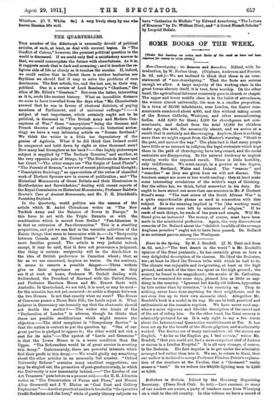THE QUARTERLIES.
This number of the Edinburgh is unusually devoid of political articles, of such, at least, as deal with current topics. In " The Conflict of Colour," however, the greatest political question in the world is discussed. U we could only find a satisfactory answer to that, we could contemplate the future with cheerfulness. As it is, it suggests much that is dark and menacing ; and it touches the re- ligious side of life as closely as it touches the secular. If, indeed, we could realise that in Christ there is neither barbarian nor Scythian we should find it easy to solve the problems of race dominance. The first article, too, and the last are, in their way, political. One is a review of Lord Rosebery's " Chatham," the other of Mr. Elliot's " Goschen." But even the latter, interesting as it is, reads like ancient history. What an incredible distance we seem to have travelled from the days when "Mr. Chamberlain avowed that he was in favour of electoral districts, of paying members of Parliament, and of universal suffrage" ! —A subject of vast importance, which certainly ought not to be political, is discussed in "The British Army and Modern Con- ceptions of War," these " conceptions " being the German and French theories of military operations.—In historical archae- ology we have a very informing article on "Roman Scotland." We think the writer is a little too depreciatory of the genius of Agricola. What if he did think that Ireland could be conquered and held down by eight or nine thousand men? How many had Strongbow at his back ?----One highly picturesque subject is supplied by "The Barbary Corsairs," and another, at the very opposite pole of things, by " The Duchesse du Marne and her Court."—The other essays are "The Origin of Land Plants"; " The Pursuit of Reason," a review of recent philosophical thought ; " Descriptive Sociology," an appreciation of the series of classified work of Herbert Spencer now in course of publication ; and " The Historical Monuments of Great Britain and their Illustration in Hertfordshire and Berwickshire," dealing with recent reports of the Royal Commission on Historical Monuments; Professor Baldwin Brown's Care of Ancient Monuments, and Mr. P. H. Ditchfield's Vanishing England.
In the Quarterly, world politics are the essence of the article which M. Andre Ch6ra.dame writes on "The New Turkish Army and the Balance of Power in Europe." Is this force to act with the Triple Entente or with the combination which is moved from Berlin? "Pan-Titan:ism is in fact an extension of Pan-Germanism." This is a startling proposition, and yet we can find in the versatile activities of the Kaiser things that seem to harmonise with it.—In "Reciprocity between Canada and the United Stares " we find ourselves on more familiar ground. The article is very judicial indeed, except, it may be said, that it does not pronounce a judgment. One thing is certain: reciprocity will be the death-blow to the idea of British preference to Canadian wheat ; that, as far as we are concerned, inspires no terror. On the contrary, it seems to remove a possible danger.—Three writers give us their experience on the Referendum as they see it at work at home, Professor W. Oechsli dealing with Switzerland, the President of Harvard with the United States, and Professor Harrison Moore and Mr. Ernest Scott with Australia. In Queensland, we are told, it is used, or may be used— for the occasion has not yet occurred—to settle a dispute between the two Houses. Is not that exactly what we want? The House of Commons passes a Home Rule Bill ; the Lords reject it. What believer in Democracy can honestly say that the electorate should not decide the matter P—The writer who treats of the "Declaration of London" is adverse, though he thinks that there are possible modifications which might remove the objection.—The chief complaint in "Compulsory Service" is that the nation is content to put the question by. " One of our great parties is pledged to oppose it ; the other would not risk a seat for its sake."—The upshot of " Lords and Commons " is that the Lower House is in a worse condition than the Upper. "The Referendum would be of great service in averting this decay." Unfortunately, there are powerful interests which find their profit in this decay.—We would gladly say something about the other articles in an unusually full number. "Oxford University Reform" contains many excellent suggestions; one may be singled out, the promotion of post-graduate study, in which the University is now lamentably behind.—" The Exodus of our Art Treasures " puts before us a present evil.—Sir H. H. Johnston writes on " The Preservation of Fauna and Flora," and Messrs. Allan Greenwell and J. V. Elsdon on " Coal Dust and Colliery Explosions."—Another practical matter is treated in "Co-operative Credit Societies and the Law," while of purely literary subjects we have "Catherine de Medicis " by Edward Armstrong, "The Letters of Erasmus" by Dr. William Hunt, and "A Great French Scholar" by Leopold Delis/e.


























































 Previous page
Previous page